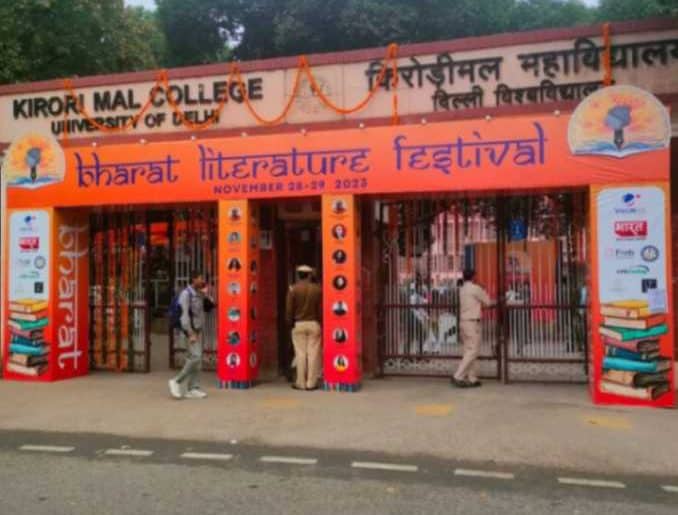Under the guise of the Bharat Literature Festival (BLF), there is a discernible attempt to spread Hindutva ideology in academics and on campus. With declining academic freedom, BLF appears to be a facet of the regime’s wider effort to systematically alter academic discourse and the college environment.
On November 28th and 29th, 2023, Kirori Mal College (KMC) hosted the Bharat Literature Festival (BLF), which drew severe criticism from college students. BLF, which “intends to connect the learnings of the complicated past with the hope & aspirations of a fascinating future,” organised its Litfest in partnership with KMC. Various renowned authors and journalists were invited for the discussions. However, the event drew more criticism as its itinerary was released, which included discussions regarding RSS and Hindutva. “Pranam Main Hindu Hun: Exploring Inner Hindutva in Popular Culture”, “Sanghe Shakti: Bharat @2047”, “Indian Continent in the Era of Prime Minister Narendra Modi”, etc. were among the topics discussed. Not only the topics, but several of the invited speakers openly support the regime and have called for the genocide of Muslims in the past.
When viewed in the context of the government’s increasing influence on academic structures, courses, academic discourses, and crackdown on academicians critical of the government, such discussions and events in a central university college with the college as co-organisers highlight how BLF is not just a litfest but a part of a broader movement seeking to assert and disseminate Hindutva principles within the realms of academics.
The Academic Freedom Index (AFI) report, published by the Global Public Policy Institute, placed India in the bottom 30% of 179 countries in 2022, with a score of 0.38 out of 1. Down to Earth extracted the Academic Freedom Score of India and found out that, “The country’s freedom index score was high in the past, ranging from 0.60-0.70 between 1950 and 2012, except from 1974-1978, data showed.” The AFI report reads, “Around 2013, all aspects of academic freedom began to decline strongly, reinforced with Narendra Modi’s election as Prime Minister in 2014.”
TW// Mention of suicide
The suicide of Rohit Vermula, the arrest of Umar Khalid, Natasha Narwal, and many other students under UAPA for participating in anti-CAA protests, the increasing crackdown on Kashmiri students, and the recent controversy over a research paper by an Ashoka University professor titled ‘Democratic Backsliding in the World’s Largest Democracy’, which alleged voter suppression to favour Modi in the 2019 election, all highlight the country’s deteriorating academic freedom.
All of this, when reviewed in the context of NEP and CUET implementation, points to a more concerning scenario. With the adoption of CUET, student population diversity has decreased, with the majority of students being affluent ‘apolitical’ CBSE students from the North Belt. This apolitical student group fails to understand and acknowledge the hidden politics behind these events, and they fall into the trap that gradually shapes their way of thinking in the direction the regime wants.
On the condition of anonymity, a third-year KMC student stated, “A lot of my friends and classmates were there, posting stories about BLF.” They are the same folks that will go and discuss casteism, patriarchy, and Islamophobia in their events and discussions. This set of students only wants to talk about these topics in order to feel good about themselves and fall into the category of ‘Progressive Liberal DU Student,’ while failing to understand the real-life ramifications and implementations of the same.”
In a message circulated in Whatsapp groups, the principal wrote, “During the event, I expect you to (i) Be very disciplined and well behaved, (ii) Be appropriately well dressed according to the theme of the festival…Please note that there is no change in the teaching schedule of the college.” In contrast, students reported disruptions and class cancellations as a result of classrooms being converted into visitor rest areas. A volunteer from the BFL organising committee spoke about the threats posed by the conveners of their college societies. A person said, “We had pressure from the administration, who threatened us. The context for that is hard to explain, but we are being heavily monitored.”
Another thing to notice here is the indirect imposition of Hindi throughout the event. The majority of the discussion titles were in Hindi, and there was no representation of North-East and South Indian literature at the event. Not just the language, but even the titles, were linked to the regime’s policies and marketing strategies. “Mann ki Baat: Confluence of Policy and Communication in New India” and “Namami Gange” are a few examples.
While all of these are sufficient to understand that the BLF is more than simply a litfest, it also serves as a means of spreading Hindutva ideology and BJP politics. Events like these, as well as the government’s growing control over academics, limit academic freedom, further eroding it. The AFI report explains, “Pressure on institutional autonomy and campus integrity combined with constraints on academics’ freedom of expression is what distinguished India from other countries’ scores on the index. The attacks on academic freedom under Modi’s Hindu nationalist government were also possible due to the absence of a legal framework to protect academic freedom.” The report’s authors further called on higher education policymakers, university leaders, and research funders to promote academic freedom in their own academic institutions as well as abroad.” But until then, the only ways to tackle religious politics and prevent them from impacting colleges and universities are through critical study of such events, self-education, and civil disobedience.
Read Also: The Fear of Being Identified
Featured Image Credits: KMC Instagram Page(@kmcollegedelhi)
DU Beat





Comments are closed.